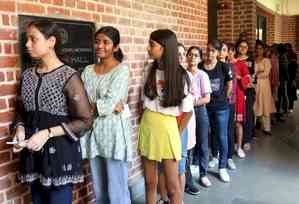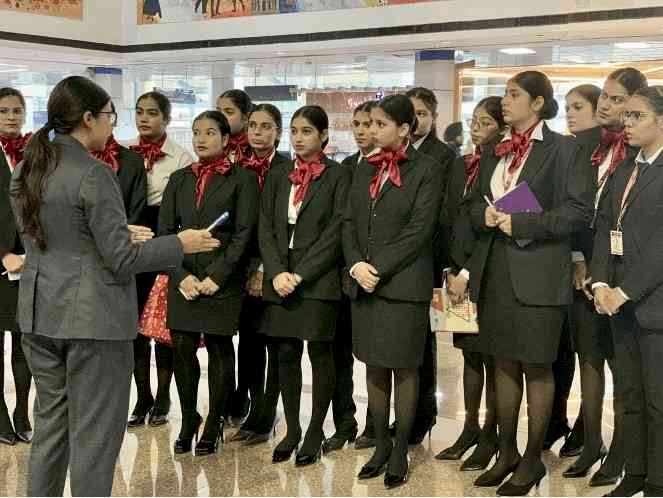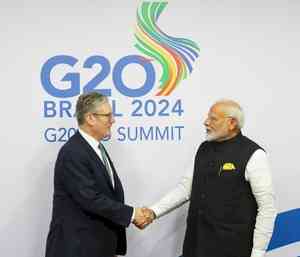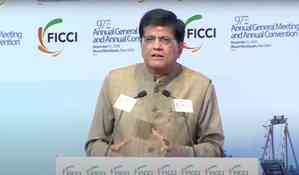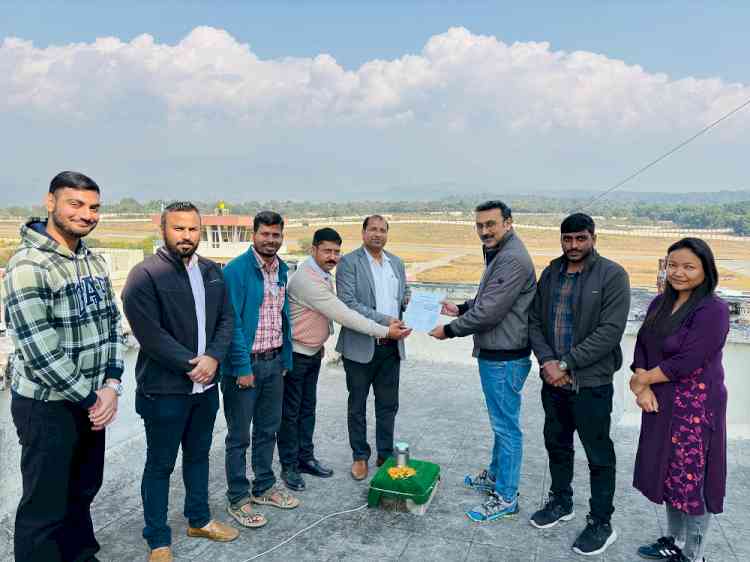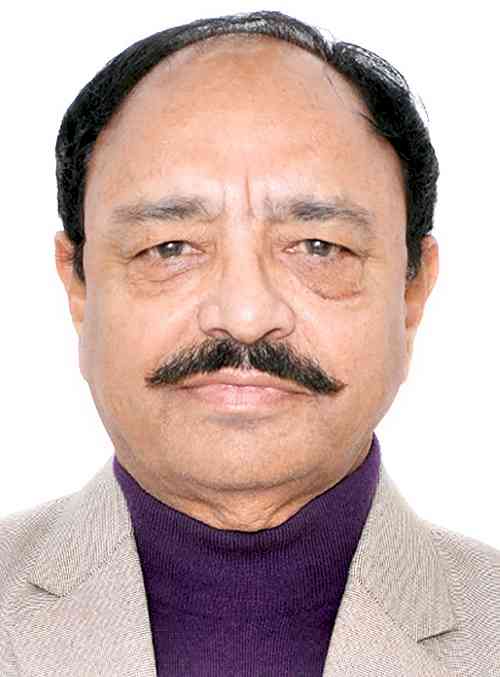RV University’s SOEPP inaugurated Centre for Global Health and Development
RV University’s School of Economics and Public Policy (SOEPP) inaugurated the Centre for Global Health and Development (CGHD) on Monday. The Centre was jointly inaugurated by distinguished experts in the fields of health and public policy.
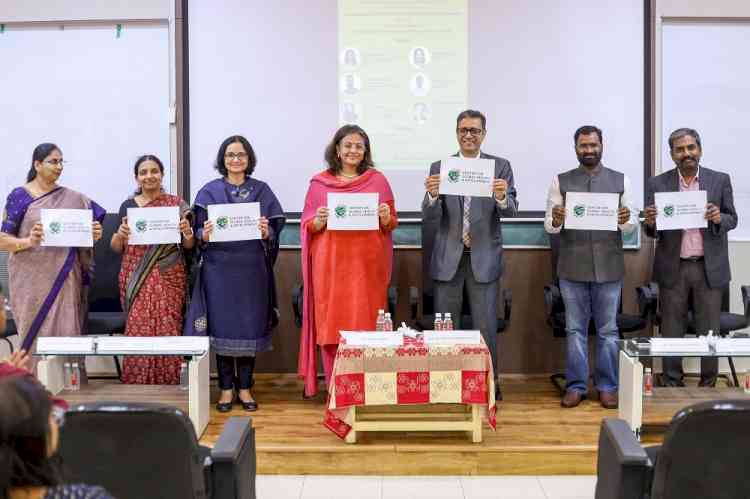
Bengaluru, August 27, 2024: RV University’s School of Economics and Public Policy (SOEPP) inaugurated the Centre for Global Health and Development (CGHD) on Monday. The Centre was jointly inaugurated by distinguished experts in the fields of health and public policy.
The inaugural ceremony was graced by esteemed dignitaries including Prof. (Dr.) Dwarika Prasad Uniyal, Vice Chancellor (i/c), RV University, Dr. Prabhdeep Kaur, Professor, Isaac Centre for Public Health, Indian Institute of Science, Bangalore, Dr. Vidhuthalai Virumbi, Founder and Director, Honeybee Population Healthcare Foundation, Dr. Sumana Arora, Senior Consultant, Health, NITI Aayog, Dr. Mohan Kumar, Senior Epidemiologist, Safetynet, Prof. Pushkarni Panchamukhi, Associate Dean, SOEPP at RVU and Prof. Ranjini C. Raghavendra, Professor and Executive Director, The Centre for Global Health and Development at RVU.
Prof. Ranjini C. Raghavendra who heads the Centre, presented the Centre's vision, mission, and focus areas, along with a tentative roadmap of activities planned for the academic year 2024-25. She provided an overview of the concepts of public health and global health, explaining that public health operates at a broad level to improve the health of entire populations, and when expanded to a global context, it addresses issues that transcend national borders. The ultimate goal is to enhance the health of individuals within communities and ensure equity.
Prof. Dwarika Prasad Uniyal welcomed the guests and, in his address, encouraged students to be open-minded and think beyond disciplinary boundaries to find answers and solutions to current issues. He commended SOEPP for its efforts, quality of work, and growth. The dignitaries also unveiled the logo of the new Centre, designed by an alumnus of RV University. This event marks the first major initiative by SOEPP since its establishment.
Bridging Health and Development: Panel Discussion on Global Health Challenges in the Post COVID-19 World
In addition to the inauguration, the Centre for Global Health and Development (CGHD) organized a panel discussion on ‘Global Health Challenges in the Post-COVID-19 World.’ The discussion began with a brief introduction to the concept of welfare and development by Prof. Pushkarni Panchamukhi, who emphasized that development is central to economics. She highlighted the role of good health in economic development and improving the quality of life. Citing the capability approach and human development perspectives, she set the stage for a deeper understanding of the connection between health and development.
Dr. Sumana Arora highlighted the role of good health as the basis of all human activities. She stated that health is, on the one hand, a personal issue and, on the other, a major instrument of socio-economic development. She said that policymaking is a highly complex task and needs coordination by multiple ministries and departments and, most importantly, state governments. A whole of government and whole of society approach is of essence. She talked about the positive changes that have happened in India in recent years in improving health accessibility and affordability, healthcare supply and infrastructure and digital healthcare. She also emphasised that the young generation need to take ownership of the development of this great nation and together take the nation to greater heights.
Dr. Prabhdeep Kaur addressed the topic ‘Non-Communicable Diseases: Challenges and Way Forward,’ underscoring the role of good health in promoting holistic development. She described non-communicable diseases as a barrier to development, noting a significant increase in their prevalence in India between 1990 and 2019. This rise has led to productivity loss and premature mortality, which are detrimental to society and the nation. Dr. Kaur cited lifestyle and dietary changes, genetics, and low life expectancy as major contributors to this growing burden. She also discussed biological, behavioural, and structural risk factors, emphasizing the need for improvement in societal structure and policies to promote healthy living. She advocated for regular health check-ups, a healthy diet, and physical activity to reduce health risks.
Dr. Mohan Kumar spoke on the topic ‘The Need for a Revised Approach to Capacity Building: Lessons from the COVID-19 Pandemic.’ He highlighted the success of India's immunization program and the importance of the public health system. As health is a state subject in India, he stressed the need for appropriate action at the state level, with the central government providing guidelines and funding. Dr. Kumar discussed primary, secondary, and tertiary healthcare sectors and the importance of a comprehensive approach to capacity building in healthcare, including community awareness programs.
Dr. Vidhuthalai Virumbi addressed the topic ‘Population Governance and Research for Achieving Localized SDGs,’ discussing the relationship between migration and development. He emphasized the critical role of research in societal improvement, stating that all research aimed at societal betterment culminates in development. Dr. Virumbi also talked about population-scale programs, healthcare welfare schemes, and opportunities for funding to enhance health outcomes.


 City Air News
City Air News 
